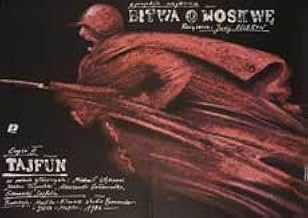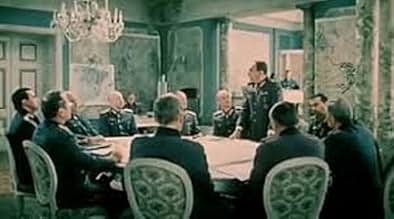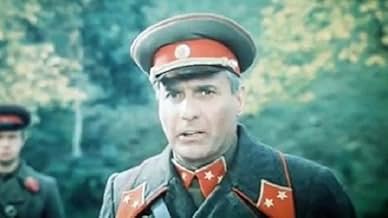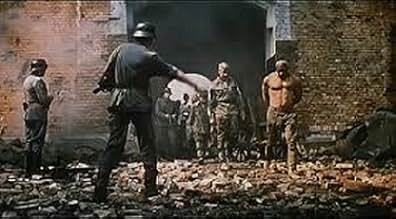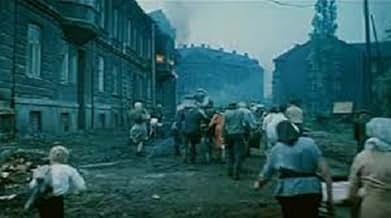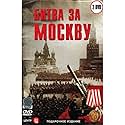IMDb-BEWERTUNG
7,3/10
494
IHRE BEWERTUNG
Die Schlacht bei Moskau war die erste große Niederlage der deutschen Wehrmacht im Zweiten Weltkrieg. Der Film ist einigen Kampfereignissen gewidmet, die in der UdSSR nach der Eroberung Weste... Alles lesenDie Schlacht bei Moskau war die erste große Niederlage der deutschen Wehrmacht im Zweiten Weltkrieg. Der Film ist einigen Kampfereignissen gewidmet, die in der UdSSR nach der Eroberung Westeuropas durch Hitler stattfanden.Die Schlacht bei Moskau war die erste große Niederlage der deutschen Wehrmacht im Zweiten Weltkrieg. Der Film ist einigen Kampfereignissen gewidmet, die in der UdSSR nach der Eroberung Westeuropas durch Hitler stattfanden.
Folgen durchsuchen
Handlung
WUSSTEST DU SCHON:
- WissenswertesIn Vietnam, with the help of cinematographers from the FAFIM Vietnam studio, several scenes were shot for the film, recreating the atmosphere of the Japanese capital in the early 1940s and episodes of the work of the Soviet intelligence officer Richard Sorge in Tokyo.
- PatzerShells can be seen exploding over battlefields. Timed shells were seldom if ever used for this purpose in the Second World War.
- VerbindungenFeatured in Legendy mirovogo kino: Yury Ozerov
Ausgewählte Rezension
It has been 70 years since the Second World War began to be felt in the Soviet Union, and almost hit its great capital of Moscow.
In 1985, in time for the ruby jubilee of the final Allied victory in Europe and the 20th anniversary of Moscow's proclamation as a Hero City of the Soviet Union, the two episode movie series Battle of Moscow debuted in theaters across the USSR. Yuri Ozerov sure made Muscovites proud since he had at last made a great movie about the first days of the war, and the battles for the defense of Brest Fortress, of Kiev and of Russia's greatest city and capital, Moscow.
The first episode chronicles the beginning of the war on June 22, 1941 and of the bravery and valor shown by the Red Army in the Brest Fortess, Yelnya and Kiev. The second episode is focused on the battles for Moscow itself. The best parts of it is the November 7 parade at Red Square where Yakov Tripolski reminds us of Joseph Stalin's address to the Soviet people and armed forces telling them to fight bravery against the German fascists, how Zoya Kosmodemyanskaya (acted well here by Irina Shemliova) became a heroine partisan and later posthumously became the 1st lady partisan Hero of the Soviet Union, and of the heroism of the 8th Rifle Division led by its commander Ivan Panfilov (Konstanin Stepankov) and its political commissar acted here by Aleksandr Voevodin against the German Army, and later documents the later counterattack led by General of the Army Georgy Zhukov (Mikhail Ulyanov) of the entire Red Army and Red Air Forces, composed of military academy and school cadets, cavalry forces including that of the 2nd Guards Cavalry Corps commanded by General Lev Dovator (Lev Pregunov), citizen partisans, regular infantry and Siberian riflemen and ski soldiers aided by fighters, interceptors, attack aircraft and bombers of the Red Air Forces and the Red Army Air Defense Forces, plus artillery and the armored and motorized infantry units.
The end scenes of part 2 of the 2nd episode with a montage of Moscow 44 years after that battle set to the movie theme song by Aleksandra Pakhmutova and Nikolai Dobronranov and sung perfectly by Lev Leshchenko truly gets me every time, for this reminds us of the many lives lost in the city's defense. And speaking of the musical score, it was also great and fitting to the action (although it was mostly shot at Moscow and in Czechoslovakia, most especially the battle scenes, and some scenes were shot in Vietnam).
Indeed, 70 years have passed, but the spirit of Moscow's defenders who showed the world how to fight against the forces of fascism truly live on in our hearts. Moscow is truly indeed a Hero City of Russia and the battles for it an example of the brute force and effects of all-out war against the forces of evil.
Eternal glory to all these brave defenders of Moscow, who died for us to live in freedom and peace, and gave us a free and great world on which we stand against evil. I'll always think of them everyday and when I soon go to Moscow's Eternal Flame... I'll remember them all.
In 1985, in time for the ruby jubilee of the final Allied victory in Europe and the 20th anniversary of Moscow's proclamation as a Hero City of the Soviet Union, the two episode movie series Battle of Moscow debuted in theaters across the USSR. Yuri Ozerov sure made Muscovites proud since he had at last made a great movie about the first days of the war, and the battles for the defense of Brest Fortress, of Kiev and of Russia's greatest city and capital, Moscow.
The first episode chronicles the beginning of the war on June 22, 1941 and of the bravery and valor shown by the Red Army in the Brest Fortess, Yelnya and Kiev. The second episode is focused on the battles for Moscow itself. The best parts of it is the November 7 parade at Red Square where Yakov Tripolski reminds us of Joseph Stalin's address to the Soviet people and armed forces telling them to fight bravery against the German fascists, how Zoya Kosmodemyanskaya (acted well here by Irina Shemliova) became a heroine partisan and later posthumously became the 1st lady partisan Hero of the Soviet Union, and of the heroism of the 8th Rifle Division led by its commander Ivan Panfilov (Konstanin Stepankov) and its political commissar acted here by Aleksandr Voevodin against the German Army, and later documents the later counterattack led by General of the Army Georgy Zhukov (Mikhail Ulyanov) of the entire Red Army and Red Air Forces, composed of military academy and school cadets, cavalry forces including that of the 2nd Guards Cavalry Corps commanded by General Lev Dovator (Lev Pregunov), citizen partisans, regular infantry and Siberian riflemen and ski soldiers aided by fighters, interceptors, attack aircraft and bombers of the Red Air Forces and the Red Army Air Defense Forces, plus artillery and the armored and motorized infantry units.
The end scenes of part 2 of the 2nd episode with a montage of Moscow 44 years after that battle set to the movie theme song by Aleksandra Pakhmutova and Nikolai Dobronranov and sung perfectly by Lev Leshchenko truly gets me every time, for this reminds us of the many lives lost in the city's defense. And speaking of the musical score, it was also great and fitting to the action (although it was mostly shot at Moscow and in Czechoslovakia, most especially the battle scenes, and some scenes were shot in Vietnam).
Indeed, 70 years have passed, but the spirit of Moscow's defenders who showed the world how to fight against the forces of fascism truly live on in our hearts. Moscow is truly indeed a Hero City of Russia and the battles for it an example of the brute force and effects of all-out war against the forces of evil.
Eternal glory to all these brave defenders of Moscow, who died for us to live in freedom and peace, and gave us a free and great world on which we stand against evil. I'll always think of them everyday and when I soon go to Moscow's Eternal Flame... I'll remember them all.
- jmramos0109
- 13. Okt. 2011
- Permalink
Top-Auswahl
Melde dich zum Bewerten an und greife auf die Watchlist für personalisierte Empfehlungen zu.
Details
- Erscheinungsdatum
- Herkunftsländer
- Sprachen
- Auch bekannt als
- Битва за Москву
- Drehorte
- Novosibirsk, Novosibirskaya Oblast, Russland(battle scenes)
- Produktionsfirmen
- Weitere beteiligte Unternehmen bei IMDbPro anzeigen
- Laufzeit5 Stunden 58 Minuten
- Farbe
- Seitenverhältnis
- 2.35 : 1
Zu dieser Seite beitragen
Bearbeitung vorschlagen oder fehlenden Inhalt hinzufügen

Oberste Lücke
By what name was Schlacht um Moskau (1985) officially released in Canada in English?
Antwort
